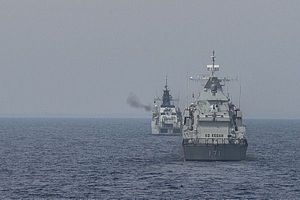This week, Indonesia, Malaysia, and the Philippines finally launched their trilateral air patrols in the Sulu Sea. Though this was the latest step in ongoing indigenous, minilateral cooperation between the three states to contend with security threats amid the rising Islamic State threat, questions continue to be posed about what kind of role other major powers, chiefly the United States and China, could play in it.
Major power involvement in such indigenous, minilateral security initiatives, including this one, is nothing new, as I’ve repeatedly written (See: “Confronting Threats in the Sulu-Sulawesi Seas: Opportunities and Challenges”). The Malacca Strait Sea Patrols (MSSP) that got underway in the 2000s prompted similar interest from other actors, including the United States. And with respect to the Sulu Sea, we have in fact already seen some vague talk and a few more specific actions in this direction, some of which have pulled in Washington and Beijing (See: “Can China Patrols Help Duterte in the Philippines’ Terror War?”).
Indonesian Defense Minister Ryamizard Ryacudu once again put this angle in the spotlight at the launching of new trilateral air patrols at Subang Air Base this week when he said that though there were requests from countries, including the United States and China, to join the patrols, this would need to be considered carefully.
As further expansions of this relatively new, indigenous, minilateral security arrangement continue to be talked about, a couple of things are worth keeping in mind with respect to how this is properly framed.
First, it is important to underline that any sort of expansion of indigenous, minilateral security arrangements needs to be framed around the extent to which such an expansion can actually benefit those arrangements as opposed to undermine them.
This is additionally important to keep in mind because trilateral cooperation in the Sulu Sea has been hard enough to forge amongst even the existing countries so far, though not surprising given the challenges that were clear at conception and the expected issues with ongoing implementation as well (See: “What’s Next For The New Sulu Sea Trilateral Patrols?”).
Outside actors can no doubt add much-needed capabilities, expertise, and heft, integration in such initiatives. But given how the trilateral patrols have evolved so far, it is clear that expansion needs to be done at a level that is comfortable with the initial actors and in a way that does not put too much pressure on an important initiative.
Caution on this score ought not to be dismissed, even though it is often advanced as a public reason amid other private concerns, such as lingering distrust of outside interference among some countries or worries about bringing U.S.-China competition into an indigenous initiative so early on (See: “The Ticking Clock on Trump’s Asia Strategy”).
Second, expanding these patrols should not be seen exclusively or even primarily as being about major powers like the United States and China at the outset. Indeed, it might be the case that for various reasons – including aversions to outside interference or concerns about pacing – expansion progresses more incrementally, involving other fellow Southeast Asian states, other regional powers, and then also some limited U.S. and Chinese involvement with individual countries or in some select activities.
Though this incremental expansion might be much slower than some would like, it is not without its benefits. For instance, as I have noted previously, there is a lot of sense to this incremental expansion beginning with Singapore and Brunei (for now have been added as observers, and defense representatives from both countries attended the air patrol launch ceremony in Subang this week) (See: “Sulu Sea Trilateral Patrols in the Spotlight at 2017 Shangri-La Dialogue”).
Singapore’s involvement is particularly important, because of its membership in MSSP in the 2000s as well as its Information Fusion Center (IFC) in Changi Naval Base, which, since its establishment in 2009, has become a crucial hub for strengthening multinational and interagency cooperation to counter a range of maritime security threats.
Beyond other Southeast Asian states and major powers like the United States and China, it is also important to keep in mind that there are other actors that might have something to contribute to these efforts as well, with Australia being just one example (See: “New Australia Military Terror Aid for the Philippines?”).
Third and finally, to the extent that a formal U.S. or Chinese role is contemplated, this should be framed not narrowly as another example of major U.S.-China competition to latch on to – or worse, hijacking – existing minilateral efforts for fear of being left behind or getting ahead, but more generally as these powers contributing to the resolution of existing security challenges in concert with regional states.
This can be done not just through the patrols themselves, but other related initiatives too. That bears noting, particularly given lingering sensitivities around the shape of involvement of certain powers, namely China, despite its growing security role which some Southeast Asian states welcome (See: “China: New White Paper, Old Asia Conundrum”).
It is worth noting, for instance, that even though there has not been an official U.S. role in terms of trilateral patrols, Washington has already been incorporating the Sulu Sea in some of its existing exercises with Southeast Asian states. The recent maritime training activity with the Philippines in July was a case in point (See: “What’s With the New US-Philippines Sulu Sea Patrols Under Duterte?”).
Given what we have seen in the past, it is no surprise that U.S.-China involvement in the Sulu Sea patrols continues to be a topic of conversation. Though this does have its benefits, we need to properly frame this in the broader context of what is happening in the initiative itself so far, how to think about expansion more generally, and how major powers can contribute to resolving regional security challenges, rather than sensationalist commentary exclusively or primarily focused around U.S.-China one-upmanship.

































